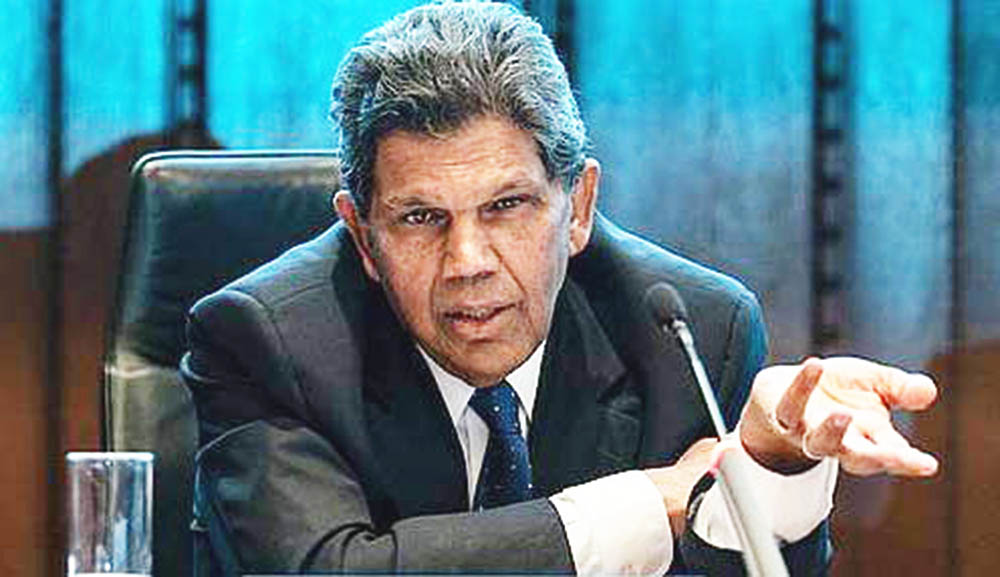By Dr Bertrand Ramcharan
In a previous offering, we suggested that UN Sustainable Development Goal 16, devoted to peace, inclusiveness and justice, provides a good framework for nation-building in a complex society such as Guyana. In this piece we look more closely at the justice dimension, drawing on a report, Justice for All, by the Task Force on Justice, a group established by Pathfinders for Peaceful, Just and Inclusive Societies, which is based at the Centre on International Cooperation of New York University.
At the heart of the UN’s 2030 Agenda for Sustainable Development lies a vision of a ‘just, equitable, tolerant, open and socially inclusive world in which the needs of the most vulnerable are met’. The Pathfinders Task Force emphasise that without increased justice, the world will not be able to end poverty, reduce inequality, reach those left behind, create conditions for shared and sustainable prosperity, or promote peace and inclusion.
The third target of SDG 16 aims to ensure equal access to justice for all by 2030. Other justice-related targets cover legal identity, injustices such as corruption and illicit financial flows, and the promotion of human rights and gender equality. A people-centred approach to justice, the Pathfinders underline, starts with an understanding of people’s justice needs and designs solutions to respond to them.
The Task Force on Justice studied the delivery of SDG 16 targets in a world where billions of people are not yet able to obtain justice. They assess that 5.1 billion people – two thirds of the world’s population – lack meaningful access to justice. The justice gap is both a reflection of structural inequalities and a contributor to these inequalities.
The global justice gap, they think, has three dimensions: first, at least 253 million people live in extreme conditions of injustice. Of these, forty million people are in modern slavery; 12 million are stateless; and over 200 million live in countries or communities where high levels of insecurity make it impossible for them to seek justice.
Second, 1.5 billion people have justice problems they cannot resolve. People in this group may be victims of unreported violence or crime; or they have a civil or administrative justice problem they cannot resolve, such as a dispute over land or the denial of a public service. The Pathfinders Task Force assess that almost 60 percent of global justice problems are currently unresolved.
Third, 4.5 billion people are excluded from opportunities the law provides. Over 1 billion people in the world lack legal identity. More than 2 billion are employed in the informal sector and the same number lack proof of housing or land tenure. This makes them vulnerable to abuse and exploitation and less able to access economic opportunities and public services.
The Task Force considers that by taking justice problems as a starting point, countries can design a better journey to solutions. In their view, a justice journey has three stages: first, people are empowered so that they can act when a legal need arises. They are helped to understand the law and seek a solution, with legal aid provided to the most vulnerable.
Second, people have access to services that are responsive to their needs and offer alternative and less adversarial pathways to justice. Third, people achieve a resolution to their problem that is fair and meets human rights standards. Remedies are appropriate and promote reconciliation. Data is used to judge whether people receive a satisfactory solution. Grievance mechanisms listen and respond to those who feel badly treated.
The Task Force on Justice stresses that justice systems must prevent problems as well as working to resolve those that have already occurred. Because it is forward-looking, prevention requires a transformation in justice systems. It requires the justice system to collaborate with other sectors so as to address the root causes of disputes and avert violence, conflict, and human rights abuses.
Effective prevention strategies should have three objectives in view: first, to promote trust in justice systems. They must provide people with a reasonable expectation that their rights will be protected, their disputes managed peacefully, and that they will be safeguarded from abuses of power.
Second, they must tackle the root causes of injustice. They must provide legal identity and other documentation and empower communities and marginalized groups to realize their rights and overcome unfairness. Third, they must use the law to reduce risk. They must strengthen legislative frameworks for the prevention of violence and implement laws and regulations that make it less likely that disputes will arise or escalate.
The Task Force thinks that four levers can help national reformers as they work towards justice for all. First, marshalling data and evidence to create awareness of the scale of the problem, while demonstrating how solutions can be cost effective. Second, innovation can bring new players into the justice sector and help develop approaches that can deliver justice at scale.
Third, smarter financing strategies can redirect resources away from ineffective approaches and towards what works. They can also attract finance from other sectors and from non-traditional investors. Fourth, new governance models and shared standards can increase coherence in a justice system, enabling a greater diversity of partners to work together towards a shared result.
When it comes to action at the national level, the Task Force offers three sets of recommendations. First, resolve the justice problems that matter most to people by conducting regular surveys. Second, prevent justice problems and create opportunities for people to participate fully in their societies and economies. Third, invest in justice systems and institutions that work for people and that are equipped to respond to their need for justice.
With its newly-found resources, and with a youthful and dynamic President, Guyana is in a unique situation to chart new courses to justice for all its people. It would send a good signal to the Guyanese people for the President to establish an Advisory Commission on Justice for All. Please think of it, Mr President.




